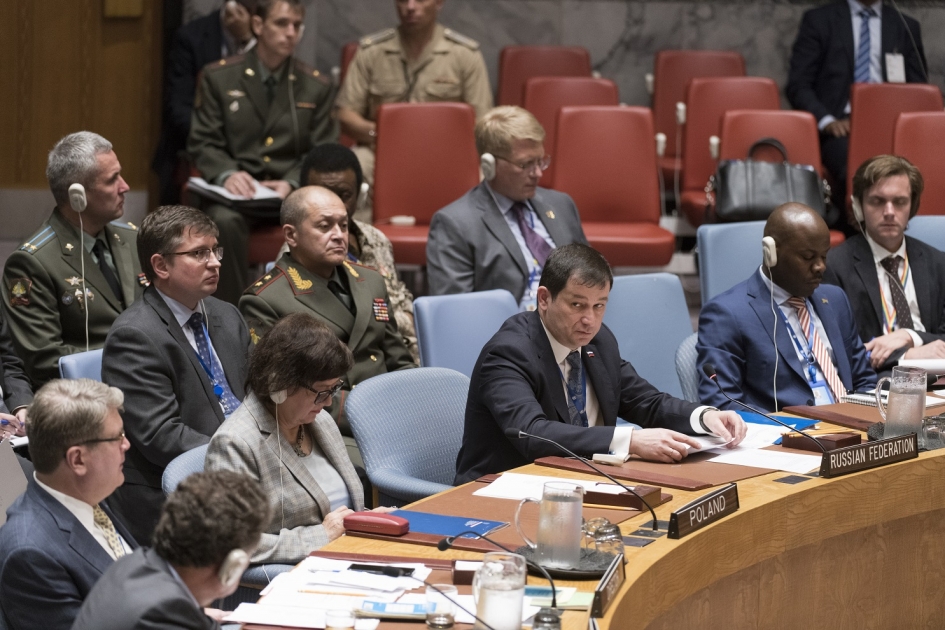Statement by First Deputy Permanent Representative Dmitry Polyanskiy at the UN Security Council Meeting on United Nations Peacekeeping Operations
Mr. President,
We thank you for organizing this meeting to discuss such a crucial issue as strengthening triangular cooperation between the UN Security Council, troop-contributing countries (TCCs) and the UN Secretariat regarding the UN peacekeeping activity.
We are thankful to Under-Secretary-General Jean Pierre Lacroix, Force Commander of MINUSMA Dennis Gyllensporre, and independent consultant of the International Institute for Peace Alexandra Novosseloff for their briefings and assessments they shared.
The relevance of triangular cooperation can hardly be overestimated. It is crucial for defining practical efficiency of the UN peacekeeping, because it brings together key stakeholders that have to do with goal setting, planning and organizing UN peacekeeping operations.
The Special Committee on Peacekeeping (C-34) is the key platform within the UN where this format of cooperation is implemented. The Special Committee is unique, because it is representative. It is in the Special Committee that Security Council member States and TCCs get together to develop shared approaches to parameters of peacekeeping activity and to have an interactive dialogue with the Secretariat on all urgent issues.
There is a vital precondition to ensure the required level of confidence between all the interested sides; it is transparency and practical compliance with all the consensus agreements that have been achieved in an inter-State format. Recommendations and conclusions developed by C-34 is what the Secretariat and peacekeeping missions on the ground should be guided by as they carry out their executive functions. This is fully applicable to concepts, manuals, guidelines and other documents developed by the Secretariat.
Therefore it is vital to stick to the ‘division of labor’ that exists within the UN system between the bodies that define the modalities of peacekeeping; besides it is crucial not to prevent the Special Committee from implementing its mandate, which is to consider general peacekeeping-related issues. Being a Charter body that is responsible for countering threats to international peace and security, the Security Council undoubtedly plays a leading role in articulating the mandates of UN peacekeeping missions in every given country.
Mr. President,
We advocate practical implementation of conclusions contained in the C-34 report regarding promotion of triangular cooperation.
We are convinced that peacekeeping mandates and conceptual know-how of the Secretariat should correlate with the opinions of both TCCs and host countries. In the first place, this will provide for a correct interpretation of the existing tasks, avoid occasional ‘overload’ of mandates; and thus it will foster their efficacy.
In this context, we see opportunities to enhance efficiency of the triangular cooperation by involving host countries, who bear the main responsibility for protection of the civil population, implementation of political process, elimination of root causes for crises, and post-conflict recovery.
We know from the practice that countries where the mission and the state actively cooperate are the ones that develop best prerequisites for effective accomplishment of the existing tasks.
Troop contributors also play a pivotal role in ensuring efficiency of UN peacekeeping, because it is the TCCs who deploy Blue Helmets who are supposed to perform tasks outlined by the Security Council. There is little doubt that their opinion and relevant information from the ground that they provide play a significant role, whereas expertise they accumulate is useful for preserving ‘institutional memory’ in the UN system, and for drawing lessons for the future. In this regard, we confirm the high value of meetings of the Security Council with TCCs prior to extending the peacekeeping mandates.
We would also like to highlight that the potential of the Military Staff Committee remains underestimated. According to Article 47 of the UN Charter, the Committee “shall be responsible under the Security Council” and should “advise and assist the Security Council on all questions relating to the Security Council’s military requirements”.
We believe it reasonable to study more carefully the ways of engaging analytical capabilities and practical assistance of the Military Staff Committee.
In particular, what deems useful is the positive practice of country visits to UN missions with subsequent reporting of recommendations to the Security Council; and also that of inviting military experts of non-permanent members of the Security Council to the sessions of the Committee.
What is also important is the acknowledgement of the authorities of the Military Staff Committee; the Secretariat should provide the required assistance to the Committee’s activities to promote peacekeeping and security.
Thank you.
